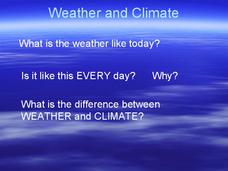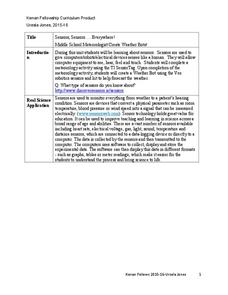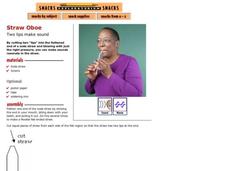Teach Engineering
May the Force Be With You: Lift
Get the class up and going with a instructional activity that discusses how airplane wings provide lift. Pupils use their knowledge of Bernoulli's Principle to develop an explanation of how it creates lift on airplane wings.
Curated OER
Conserving Electricity: Turn It Off
Second graders explore causes of air pollution and relate them to energy conservation.
Curated OER
Explore: 4th Grade Beaufort Wind Speed
Fourth graders measure wind speed, air pressure, humidity, temperature, and wind direction. They compare their observations with those of actual weather forecasts.
Curated OER
Weather
Students explore the earth's atmosphere, weather, and climate. They begin class with a discussion about weather patterns, atmosphere, and the layers of the earth. After the class discussion, students rotate through four stations to...
Curated OER
Everyone Knows It's Windy
Students create an anemometer, an instrument that measures wind speed.
Curated OER
What is Climate?
For this weather worksheet, students identify and explain the factors that can affect the climate in each area of the illustrated map. Then they describe the various effects of these factors, such as air pressure systems and the land...
Curated OER
Build an Anemometer
Students investigate wind speed. In this wind instrument lesson plan, students build an anemometer to measure wind speed and discuss the importance of wind speed knowledge in various professions.
Curated OER
Ocean Currents and Sea Surface Temperature
Students use satellite data to explore sea surface temperature. They explore the relationship between the rotation of the Earth, the path of ocean current and air pressure centers. After studying maps of sea surface temperature and ocean...
Curated OER
Ar.... What Gives?
Young scholars investigate the properties of air through inflated objects. In this physical science lesson, students examine gas as a state of matter. Student push on inflated objects and note the space the gas has taken up inside. Young...
Curated OER
Hurricanes
Upper elementary meteorologists take a glance at what a hurricane is and how it is formed. Because this does not get into the differences in air pressure that drive the associated winds, it may not be useful for older learners. The...
Curated OER
Warm and Cold Air
Students examine what happens to air when it is heated or cooled. They conduct an experiment using bottles and balloons, record and discuss their observations, and write a hypothesis.
Curated OER
Tracking the Weather
Students study the weather over time in this activity. In this weather activity, students record weather information from the newspaper over a month's time. They record the wind speed and direction, the barometric pressure, the air...
Curated OER
Physical Characteristics of the Troposphere
Students examine troposphere graphs and mcompare their hypotheses with data collected by weather balloons launched from the NOAA ship, Ronald H. Brown. they write summaries about the physical properties of the troposphere.
North Carolina Museum of Natural Sciences
Weather Watch Activity Guide: Groundhog Day
Exactly what do groundhogs know about weather? Not as much as your science students will after completing these lessons and activities that cover everything from the earth's rotation and the creation of shadows, to cloud...
Curated OER
Weather and Climate
It's hot today, but is that the weather or the climate? This colorful presentation isolates both concepts to allow for better understanding by covering the positioning of the planet, making comparisons of land versus water, and looking...
Teach Engineering
Weather Basics
Weather — there's more to it than meets the eye of the storm. With this resource young meteorologists learn about the basics of weather, including information about the factors that influence the weather, common weather vocabulary,...
Curated OER
States of Matter
Properties in measurement, pressure and viscosity of solids, liquids, and gases are the main topics covered in this slideshow. The explanations of Pascal's, Bernoulli's, and the Venturi effects are very clear. Easy to understand diagrams...
K12 Reader
Convection Currents
After reading a brief article on the connection between convection currents and winds, kids use information in the text to respond to a series of comprehension questions.
Kenan Fellows
Sensors, Sensors…..Everywhere! Middle School Meteorologist Create Weather Bots!
My forecast is that you'll want to use the resource. Pupils design and create a weather bot as part of a project-based unit. These bots should be able to measure temperature, humidity, barometric pressure, wind speed and direction, and...
Curated OER
Forecasting Weather
In this weather activity, students conduct an experiment where they record the weather observations for a week. Then they determine the air pressure using an aneroid barometer and estimate the amount of sky covered by clouds. Students...
Curated OER
Weather or Not
Hypothetical meteorologists' quotes help young earth scientists become acclimated to weather vocabulary. The terms are all related to air masses and forms of precipitation. This is a fun way to discover if your learners are truly...
Exploratorium
Straw Oboe
Trim the end of a straw to construct a vibrating wind instrument. Everyone in your class can make their own during a lesson on sound waves.
Weather Bug
WeatherBug
Exploring the weather has never been more intriguing! Whether you are looking for a quick glance at the 10-day forecast, trying to figure out if lightning is heading your way, or wondering what the pollen count is, you will find out...
Curated OER
Updrafts in Action
Students examine how wind can suspend rain and hail in clouds. They focus on safety precautions they can take to protect them from the hazards of thunderstorms.

























